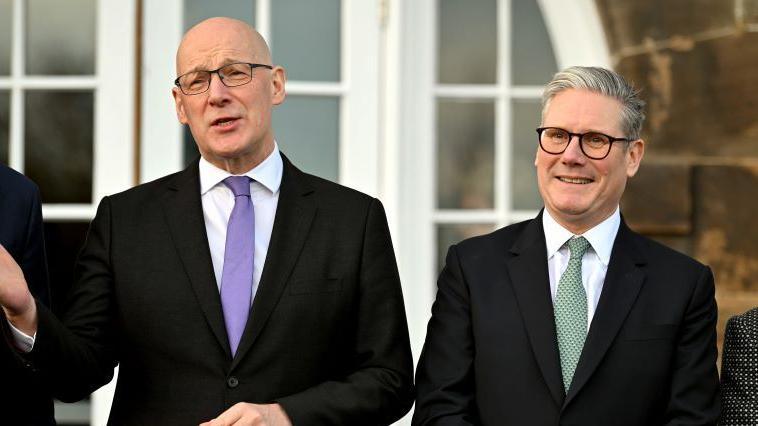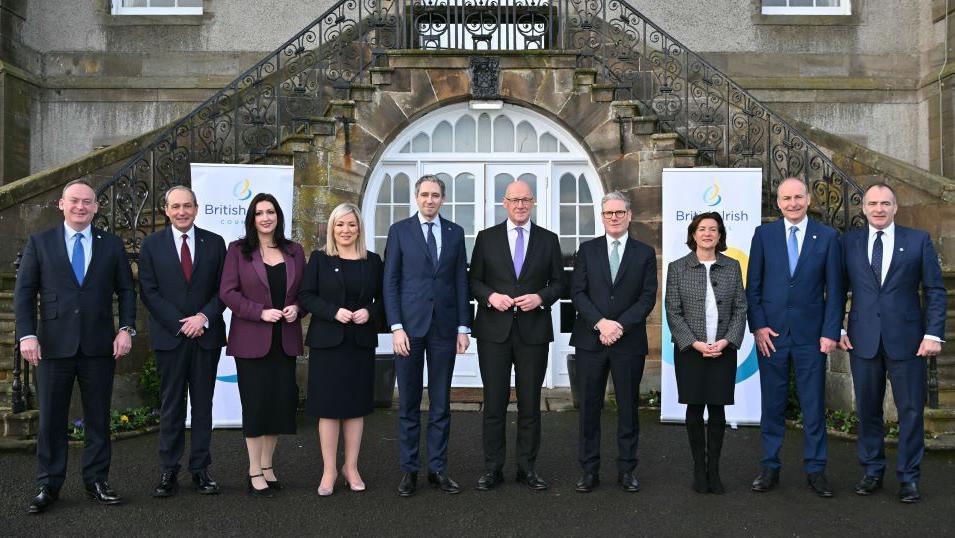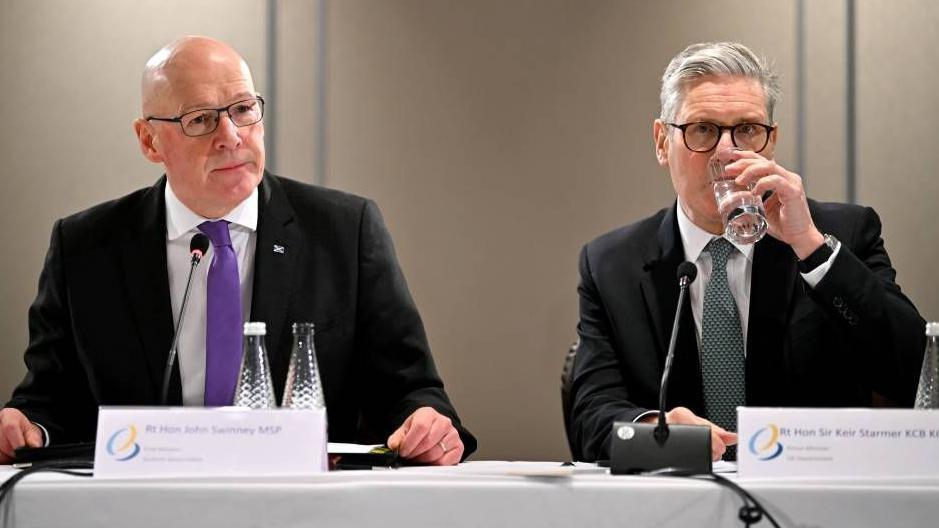PM and FM have 'helpful' talks over two-child cap

Sir Keir Starmer and John Swinney held a one-to-one meeting in Edinburgh
- Published
The Prime Minister and Scotland's First Minister have held private talks over Scottish government plans to shelve the two-child benefit cap.
Scottish government sources said Sir Keir Starmer and John Swinney had a "helpful" one-to-one meeting before the British Irish Council summit in Edinburgh.
The plan was announced in the Scottish budget at Holyrood this week.
The main focus of the British-Irish Council is the climate crisis and transitioning to clean energy.
Sir Keir is holding talks with Swinney, Irish Taoiseach Simon Harris, Welsh First Minister Eluned Morgan and Northern Irish First Minister Michelle O'Neill.
The summit - which comes 25 years after the first meeting in 1999 - is also being attended by some deputy leaders and senior government ministers, as well as representatives of crown dependencies.
It comes as relations between Westminster and Holyrood are being tested over the proposal to effectively scrap the two-child benefit cap north of the border.
Six takeaways from Keir Starmer's 'plan for change'
- Published5 December 2024
Five things we learned from the Scottish Budget
- Published4 December 2024
The UK-wide policy was originally introduced in 2017 by the Conservative government and has been kept in place by Labour.
It prevents parents from claiming universal credit or child tax credit for a third child, with a few exemptions.
Swinney says he wants to end the "heinous" two-child limit because the UK Labour government failed to do this.
Speaking after the talks, the SNP leader said: "The Prime Minister indicated to me that he would work constructively with us.
"Which is welcome, because I need the co-operation of the United Kingdom Government to enable us to achieve our objectives of lifting the two-child limit."

The Prime Minister met with representatives from across the UK in Edinburgh
The Scottish government would require assistance from the Department for Work and Pensions to create a system that will allow Holyrood to provide funding to 15,000 affected families in Scotland.
Sir Keir said his Labour government was committed to tackling child poverty, but said scrapping the cap was not a "silver bullet".
At the joint press conference in Edinburgh, Labour minister Pat McFadden said: "We all have a desire to reduce child poverty. I understand the desire absolutely.
"I understand that the money for this commitment has not been set aside.
"The first minister's government – like any government - will have to identify the money for that. That's not happened yet."
McFadden said the UK government would cooperate with the Scottish Government's request for data to implement the policy.
'Greatest challenge'
Swinney also said relations between the UK Labour and SNP Scottish government were "incomparably better" than with the previous Conservative government
However, tensions remain between the governments in a row over the UK government's plans to increase employers' National Insurance from April.
Holyrood ministers say Scotland, which has a proportionally larger public sector than the UK as a whole, needs more than £500m to compensate for increased public sector staffing costs.
It is understood the Treasury has proposed a payment of about £300m. SNP Finance Secretary Shona Robison said she would not "settle" for that figure.
The UK government says Holyrood is receiving more money than ever before from the Treasury in the next financial year.

Swinney said relations with Starmer were "incomparably better" than with the previous government
The 42nd meeting of the British-Irish Council is exploring how to finance a so-called "just transition" for workers, as nations aim to move from fossil fuel energy production to greener alternatives.
Sir Keir has named improving household finances and a transition to clean energy among his government's six priorities.
He has vowed to work constructively with devolved administrations since taking office in July.
Swinney said the meeting provided a forum on climate change "to discuss the greatest challenge facing the next 25 years".
He added: "The need to share our knowledge, our efforts and our actions is no less urgent today than it was when the first British-Irish Council meeting was held in 1999."
The council was created as part of the Good Friday Agreement to strengthen working relations between nations.